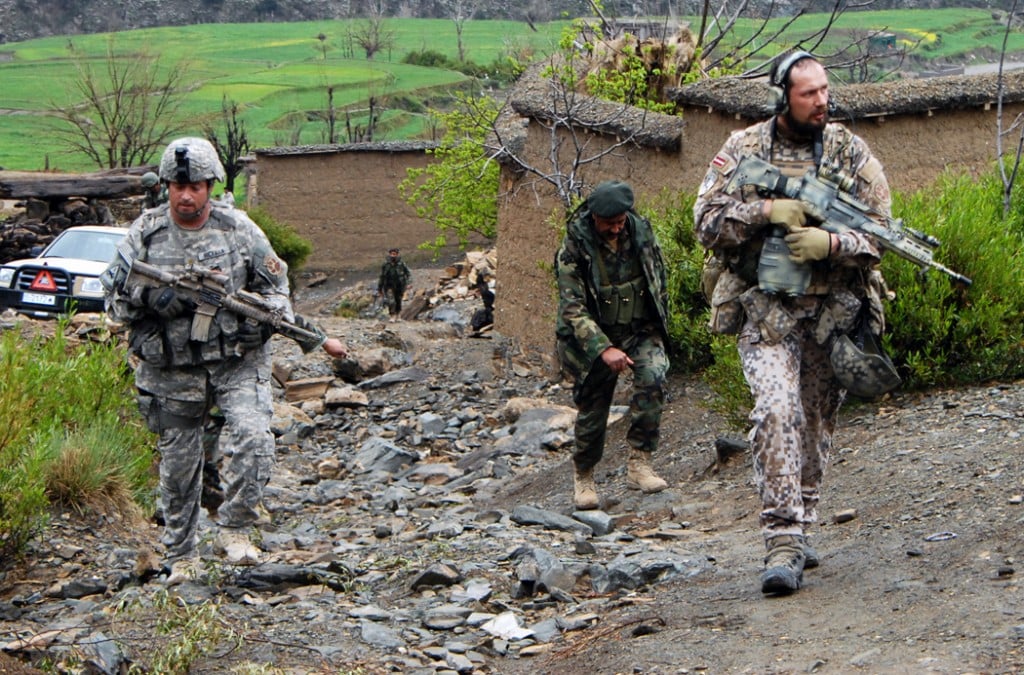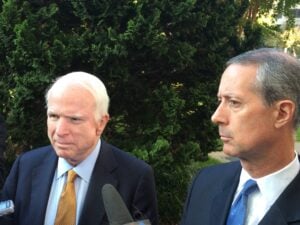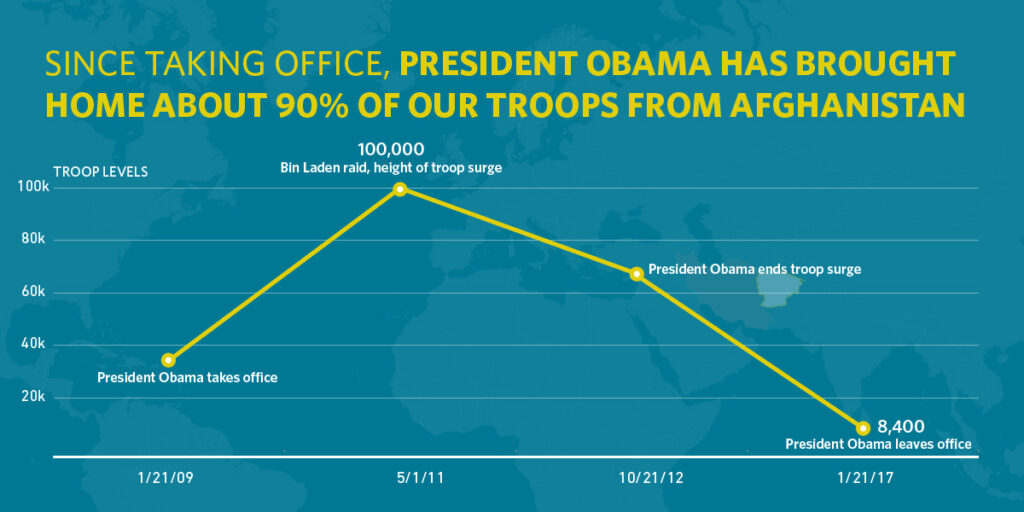Obama Keeps 8,400 Troops In Afghanistan: McCain Lukewarm, Thornberry Scathing
Posted on

A Michigan National Guard soldier patrols in Afghanistan alongside an Afghan soldier and a Latvian ally.
WASHINGTON: President Barrack Obama promised this morning to keep 8,400 US troops in Afghanistan through the end of his term. The relatively modest cut of 14 percent (down from today’s 9,800) is much less of a drawdown than Obama had once hoped for, especially as US commitments creep upward in Iraq and Syria. But leading pro-defense Republicans who wanted more forces immediately responded with faint praise or outright hostility. (Details below).

Sen. John McCain and Rep Mac Thornberry, chairmen of the Senate and House Armed Services Committees
The administration carefully announced its continued commitment to Kabul the day before the NATO summit in Warsaw, when it will have to hit up its allies for contributions of money and manpower in Afghanistan and elsewhere. It’s NATO that bears the main burden of training and advising Afghanistan’s fragile security forces, while the US focuses on hunting al-Qaeda, Daesh, & co. The 8,400-troop level allows the US to continue advising two- and three-star Afghan generals, the administration officials said; any presence at lower levels — closer to the fighting — would be starkly limited.
“We are making this announcement the day before the NATO summit,” a senior administration official emphasized to reporters. “We wanted to take this step to demonstrate the continued US leadership of the NATO mission in Afghanistan….It provides clarity about our intentions and our enduring support to Afghanistan.”
Senate Armed Services chairman John McCain had earlier urged the President to make the call before the NATO summit. “[A] timely decision on U.S. force levels is necessary so that our allies and partners can generate forces and make appropriate pledges for the Resolute Support Mission beginning in January 2017,” McCain and nine other senators wrote in May. “We urge you to announce any changes to our current planned force levels ahead of the relevant NATO conferences….”
Obama did what McCain wanted on timing, but not on numbers, where McCain damned the decision with faint praise. “I welcome President Obama’s decision to reverse his previous plan to drawdown U.S. forces in Afghanistan,” the senator said in a statement this morning. “While I believe conditions on the ground warranted retaining the current force level (i.e. 9,800), the decision to retain 8,400 U.S. troops in Afghanistan into next year is certainly preferable to cutting those forces by nearly half. That said, when the President himself describes the security situation in Afghanistan as ‘precarious,’ it is difficult to discern any strategic rationale for withdrawing 1,400 U.S. troops by the end of the year.”

White House chart of US troop levels in Afghanistan.
McCain’s counterpart, House Armed Services Committee chairman Mac Thornberry, was outright scathing. That’s something of a role reversal, since McCain is infamous for his irascibility while Thornberry tends to be the soft-spoken type of Texan. But the HASC chairman’s tone fits with his willingness to confront the administration over defense funding.
“The precision of the President’s new Afghanistan Troop Cap would be comical were its consequences not so tragic for our mission and military readiness,” Thornberry seethed. “It is time that the President level with the American people about what it will really take to achieve our goals in Afghanistan, and how much it will cost. The truth is that many thousands more Americans are performing military functions in Afghanistan than even the current troop cap authorizes” — a reference to civilian contractors. “The President refuses to pay for them, and his budget does not have room for the troops he is committing,” the congressman said.
Thornberry seized the opportunity to take a shot at the White House over war spending. The House passed Thornberry’s bill transferring $18 billion from operations in Afghanistan, Iraq, Syria, and elsewhere to cover other readiness and procurement shortfalls, arguing the new administration elected this November would request supplemental funding for its war plans anyway. (The Senate overall has been cold to this fiscal shuffle, though McCain has personally pushed for a similar $18 billion plus-up). The White House threatens to veto Thornberry’s plan, arguing it irresponsibly gambles the next Congress will make up the shortfall in time rather than, say, succumb to gridlock.
For the Administration to then turn around and ask for more troops in Afghanistan than originally planned or funded, Thornberry argues, is hypocrisy. The solution, he argues, is a supplemental spending bill — which would of course set exactly the precedent Thornberry wants for next year. “For all of the bluster about funding troops in harm’s way, it is the President who proposes to extend the vital mission without any resources behind it,” Thornberry said. “The White House must submit a supplemental funding request to accommodate troop levels in Afghanistan immediately.”
“Any time we develop options like this, we obviously look very carefully and think through what the cost associated will be,” said the first administration official. “In the past, we’ve always been able to work collaboratively with Congress to provide the necessary support for our efforts in Afghanistan.”
Subscribe to our newsletter
Promotions, new products and sales. Directly to your inbox.
